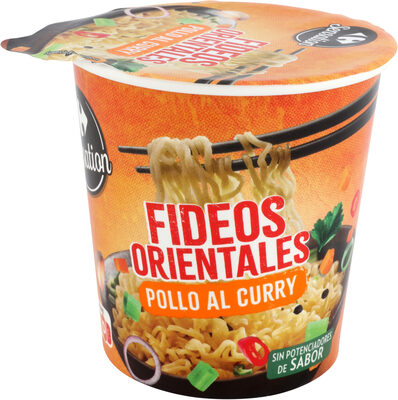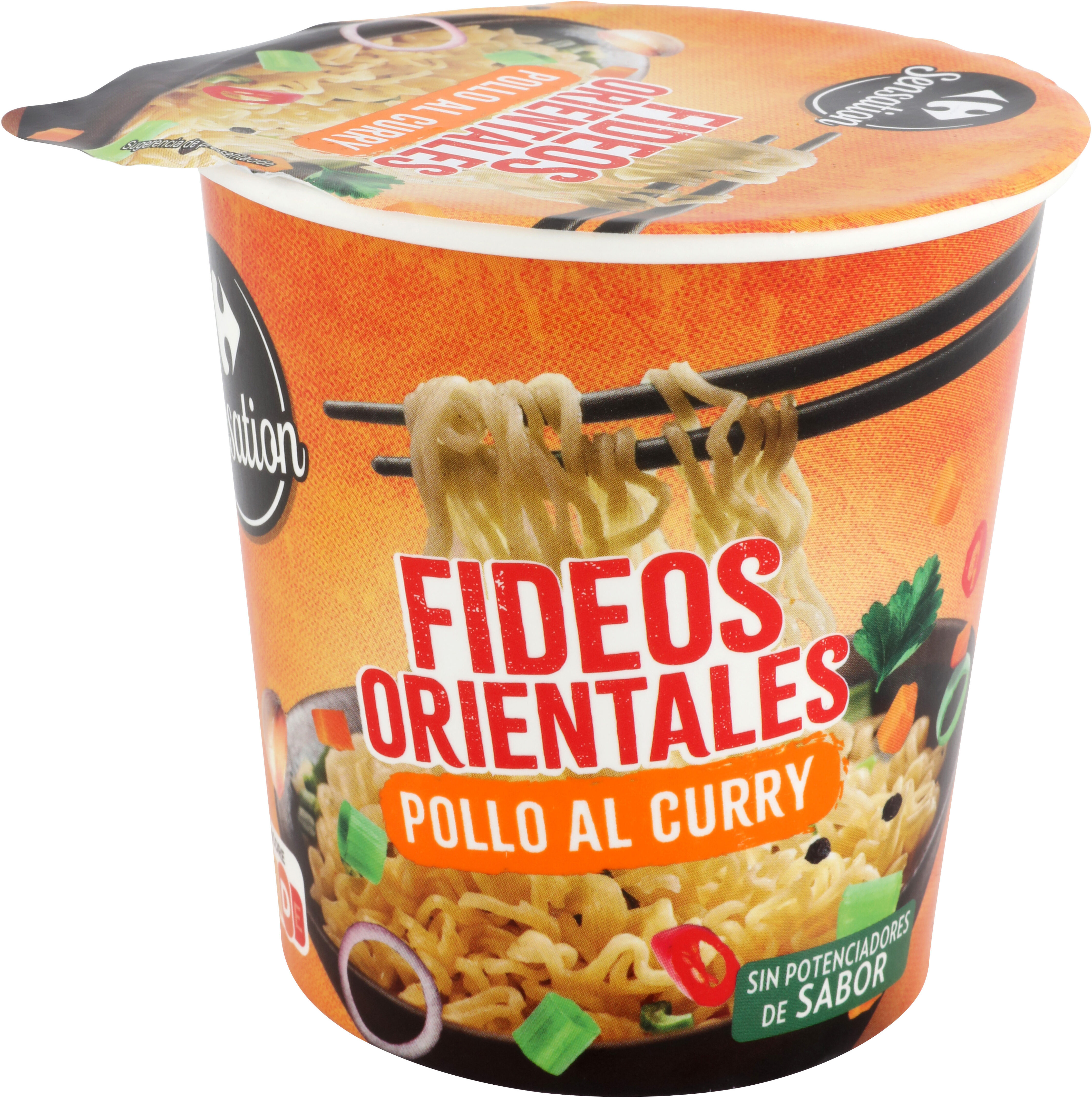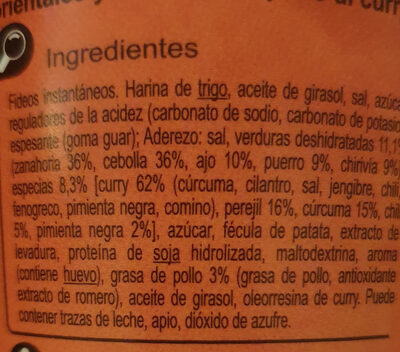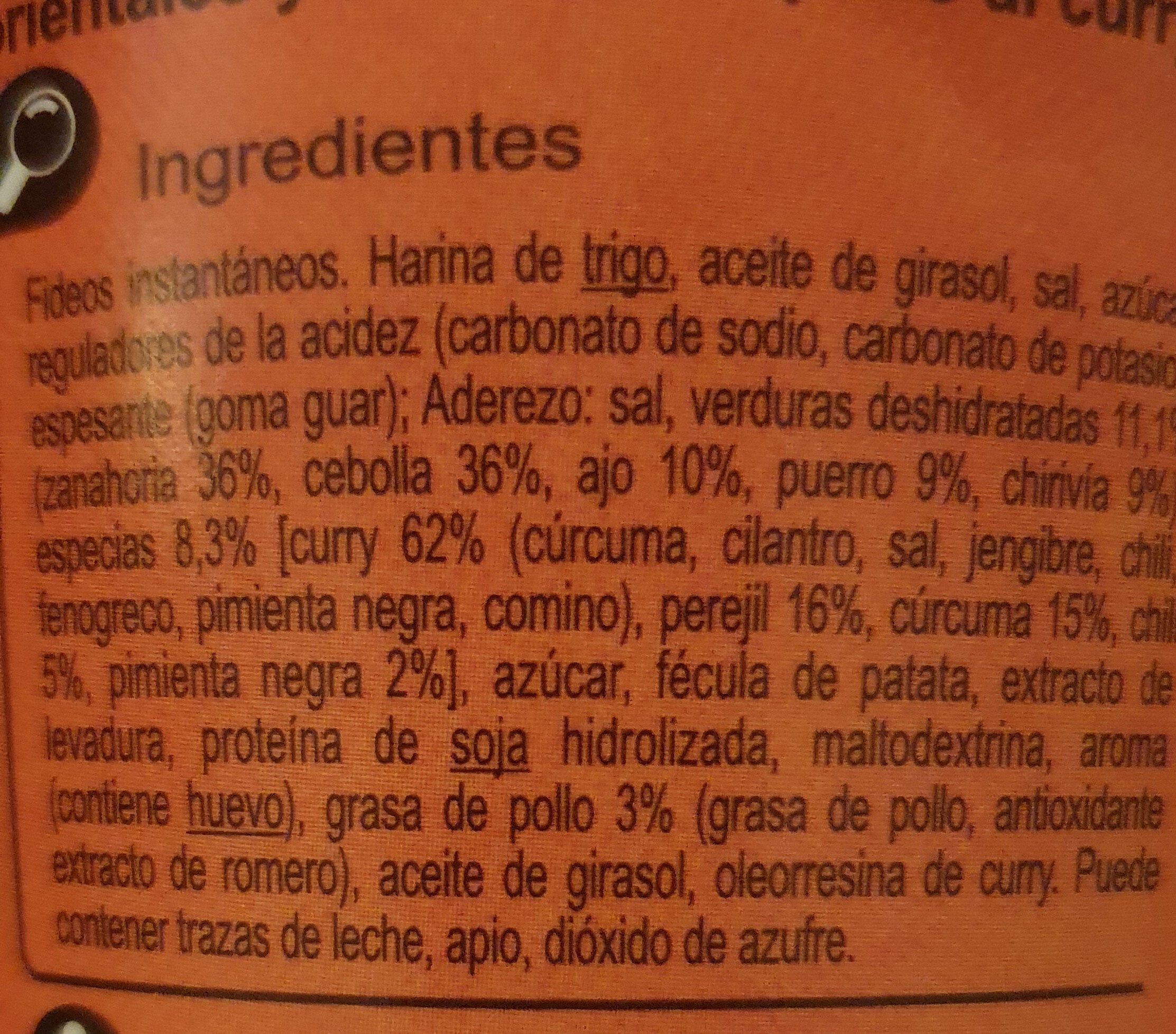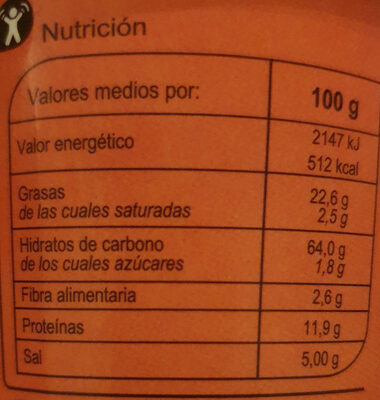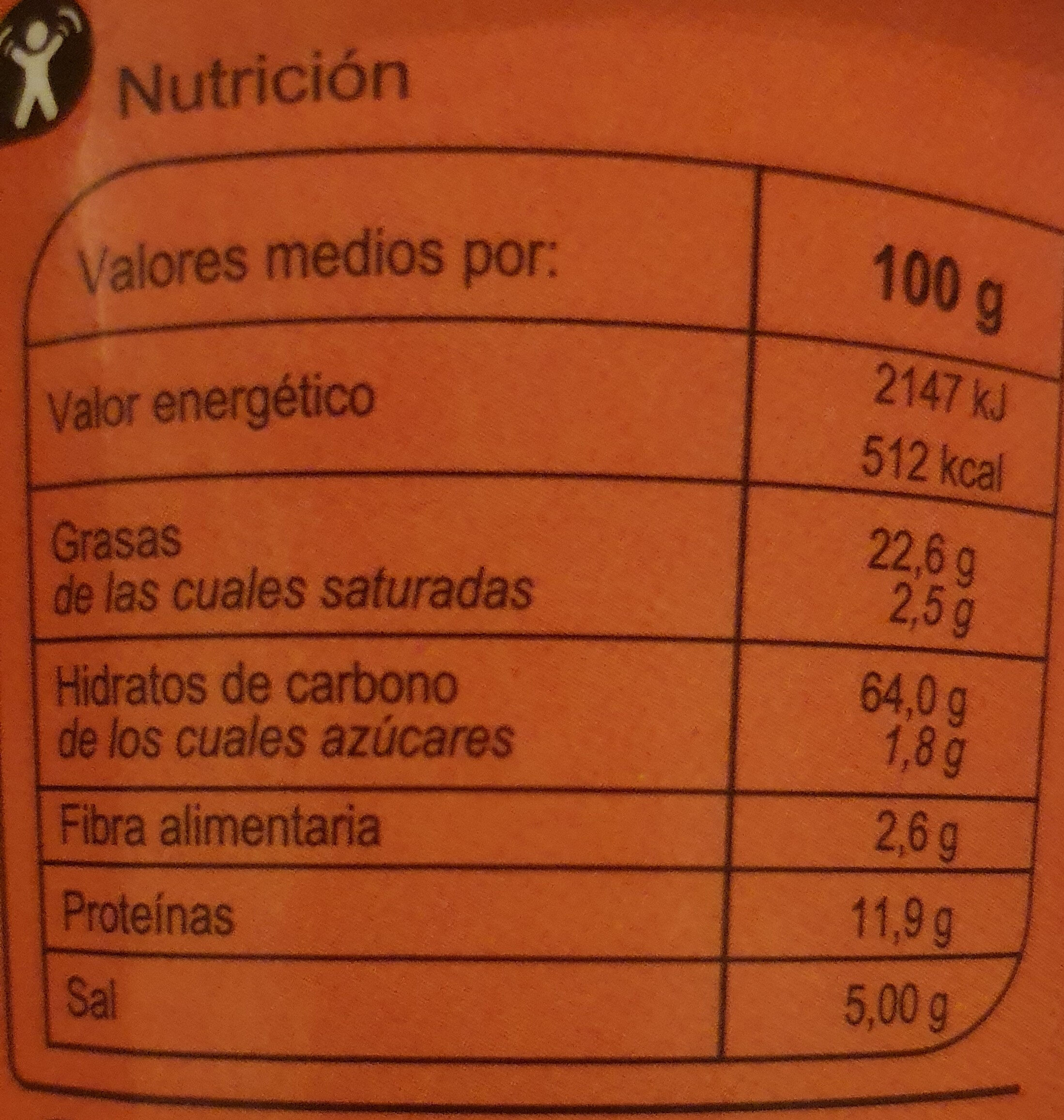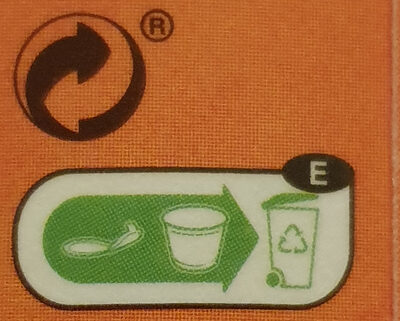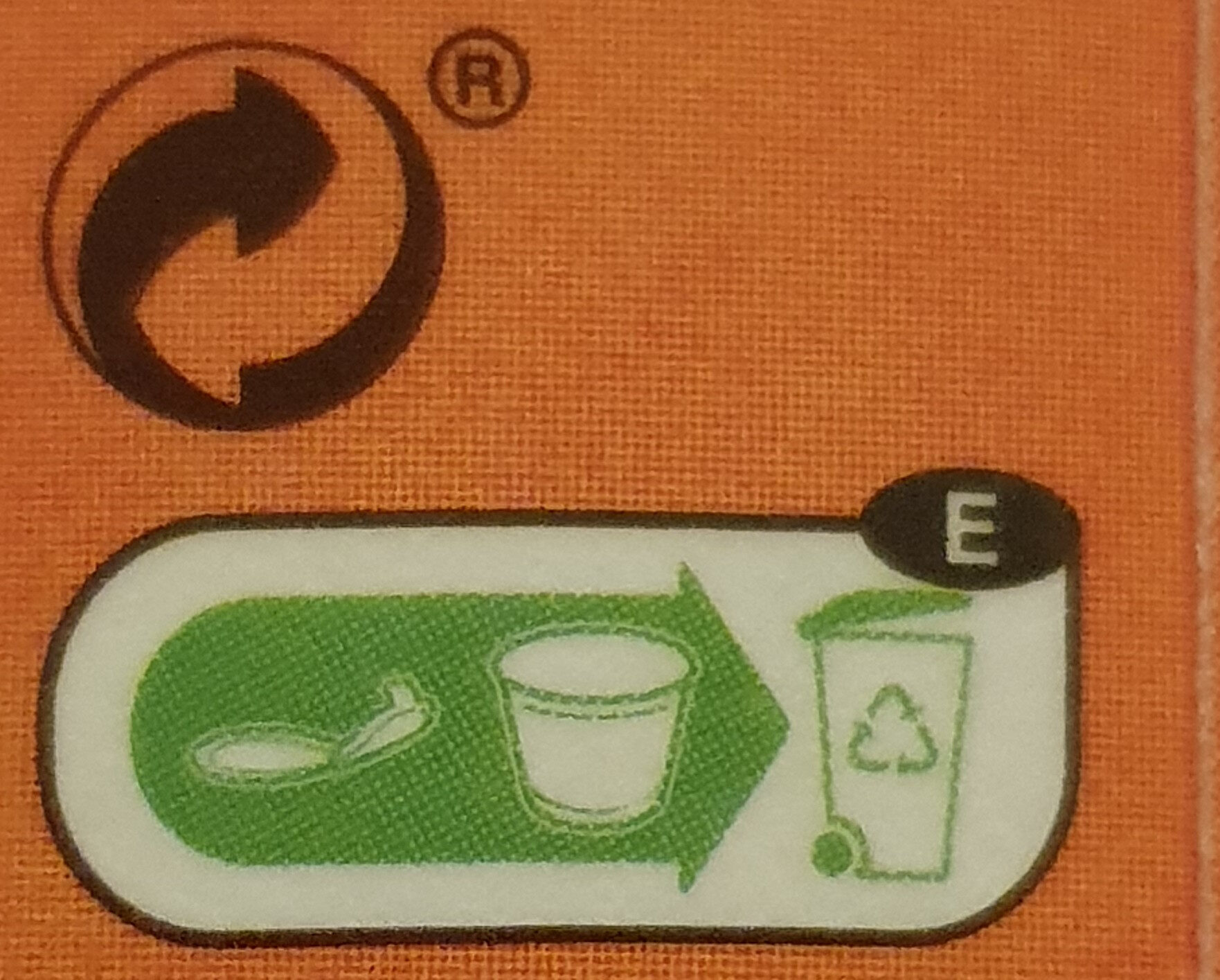Ajuda'ns a fer que la transparència alimentària sigui la norma!
Com a organització sense ànim de lucre, depenem de les vostres donacions per continuar informant els consumidors de tot el món sobre tot allò què mengen.
La revolució alimentària comença amb tu!
Noodles pollo al curry - Carrefour - 65g
Noodles pollo al curry - Carrefour - 65g
Algunes de les dades d’aquest producte les ha proporcionat directament el fabricant Carrefour España.
Codi de barres: 8431876296563 (EAN / EAN-13)
Quantitat: 65g
Empaquetament: Plàstic, en:container
Marques: Carrefour
Categories: Aliments i begudes amb base vegetal, Aliments amb base vegetal, Cereals i patates, Cereals i derivats, Menjar preparat, Productes secs, Pasta, Productes assecats per a ser rehidratats, Fideus, Sopes, en:Instant noodles, en:Chinese noodles, en:Tagliatelle
Etiquetes, certificacions, premis: Orgànic
Origen dels ingredients: Espanya
Llocs de fabricació o processament: España
Botigues: Carrefour
Països on es va vendre: Espanya
Matching with your preferences
Salut
Ingredients
-
43 ingredients
: Harina de trigo, aceite de girasol, sal, azúcar, reguladores de la acidez (carbonato de sodio, carbonato de potasio), espesante (goma guar); Aderezo: sal, verduras deshidratdas 11,1% (zanahoria 36%, cebolla 36%, ajo 10%, puerro 9%, chirivía 9%), especias 8,3% [curry 62% (cúrcuma, cilantro, sal, jengibre, chili, fenogreco, pimienta negra, comino), perejil 16%, cúrcuma 15%, chili 5%, pimienta negra 2%], azúcar, fécula de patata, extracto de levadura, proteína de soja hidrolizada, maltodextrina, aroma (contiene huevo), grasa de pollo 3% (grasa de pollo, antioxidante extracto de romero), aceite de girasol, oleorresina de curry.Al·lèrgens: en:Eggs, en:Gluten, en:SoybeansRastres: en:Celery, en:Eggs, en:Gluten, en:Milk, en:Soybeans, en:Sulphur dioxide and sulphites
Processament d'aliments
-
Aliments ultra processats
Elements que indiquen que el producte està al grup 4 - Aliments i begudes ultraprocessats:
- Additiu: E412 - Goma de guar
- Ingredient: Aromes
- Ingredient: Maltodextrina
- Ingredient: Espessidor
Els productes alimentaris es classifiquen en 4 grups segons el seu grau de processament:
- Aliments no processats o mínimament processats
- Ingredients culinaris processats
- Aliments processats
- Aliments ultra processats
La determinació del grup es fa en funció de la categoria del producte i dels ingredients que conté.
Additius
-
E412 - Goma de guar
Guar gum: Guar gum, also called guaran, is a galactomannan polysaccharide extracted from guar beans that has thickening and stabilizing properties useful in the food, feed and industrial applications. The guar seeds are mechanically dehusked, hydrated, milled and screened according to application. It is typically produced as a free-flowing, off-white powder.Origen: Wikipedia (Anglès)
-
E500 - Carbonats de sodi
Sodium carbonate: Sodium carbonate, Na2CO3, -also known as washing soda, soda ash and soda crystals, and in the monohydrate form as crystal carbonate- is the water-soluble sodium salt of carbonic acid. It most commonly occurs as a crystalline decahydrate, which readily effloresces to form a white powder, the monohydrate. Pure sodium carbonate is a white, odorless powder that is hygroscopic -absorbs moisture from the air-. It has a strongly alkaline taste, and forms a moderately basic solution in water. Sodium carbonate is well known domestically for its everyday use as a water softener. Historically it was extracted from the ashes of plants growing in sodium-rich soils, such as vegetation from the Middle East, kelp from Scotland and seaweed from Spain. Because the ashes of these sodium-rich plants were noticeably different from ashes of timber -used to create potash-, they became known as "soda ash". It is synthetically produced in large quantities from salt -sodium chloride- and limestone by a method known as the Solvay process. The manufacture of glass is one of the most important uses of sodium carbonate. Sodium carbonate acts as a flux for silica, lowering the melting point of the mixture to something achievable without special materials. This "soda glass" is mildly water-soluble, so some calcium carbonate is added to the melt mixture to make the glass produced insoluble. This type of glass is known as soda lime glass: "soda" for the sodium carbonate and "lime" for the calcium carbonate. Soda lime glass has been the most common form of glass for centuries. Sodium carbonate is also used as a relatively strong base in various settings. For example, it is used as a pH regulator to maintain stable alkaline conditions necessary for the action of the majority of photographic film developing agents. It acts as an alkali because when dissolved in water, it dissociates into the weak acid: carbonic acid and the strong alkali: sodium hydroxide. This gives sodium carbonate in solution the ability to attack metals such as aluminium with the release of hydrogen gas.It is a common additive in swimming pools used to raise the pH which can be lowered by chlorine tablets and other additives which contain acids. In cooking, it is sometimes used in place of sodium hydroxide for lyeing, especially with German pretzels and lye rolls. These dishes are treated with a solution of an alkaline substance to change the pH of the surface of the food and improve browning. In taxidermy, sodium carbonate added to boiling water will remove flesh from the bones of animal carcasses for trophy mounting or educational display. In chemistry, it is often used as an electrolyte. Electrolytes are usually salt-based, and sodium carbonate acts as a very good conductor in the process of electrolysis. In addition, unlike chloride ions, which form chlorine gas, carbonate ions are not corrosive to the anodes. It is also used as a primary standard for acid-base titrations because it is solid and air-stable, making it easy to weigh accurately.Origen: Wikipedia (Anglès)
-
E500i - Carbonat de sodi
Sodium carbonate: Sodium carbonate, Na2CO3, -also known as washing soda, soda ash and soda crystals, and in the monohydrate form as crystal carbonate- is the water-soluble sodium salt of carbonic acid. It most commonly occurs as a crystalline decahydrate, which readily effloresces to form a white powder, the monohydrate. Pure sodium carbonate is a white, odorless powder that is hygroscopic -absorbs moisture from the air-. It has a strongly alkaline taste, and forms a moderately basic solution in water. Sodium carbonate is well known domestically for its everyday use as a water softener. Historically it was extracted from the ashes of plants growing in sodium-rich soils, such as vegetation from the Middle East, kelp from Scotland and seaweed from Spain. Because the ashes of these sodium-rich plants were noticeably different from ashes of timber -used to create potash-, they became known as "soda ash". It is synthetically produced in large quantities from salt -sodium chloride- and limestone by a method known as the Solvay process. The manufacture of glass is one of the most important uses of sodium carbonate. Sodium carbonate acts as a flux for silica, lowering the melting point of the mixture to something achievable without special materials. This "soda glass" is mildly water-soluble, so some calcium carbonate is added to the melt mixture to make the glass produced insoluble. This type of glass is known as soda lime glass: "soda" for the sodium carbonate and "lime" for the calcium carbonate. Soda lime glass has been the most common form of glass for centuries. Sodium carbonate is also used as a relatively strong base in various settings. For example, it is used as a pH regulator to maintain stable alkaline conditions necessary for the action of the majority of photographic film developing agents. It acts as an alkali because when dissolved in water, it dissociates into the weak acid: carbonic acid and the strong alkali: sodium hydroxide. This gives sodium carbonate in solution the ability to attack metals such as aluminium with the release of hydrogen gas.It is a common additive in swimming pools used to raise the pH which can be lowered by chlorine tablets and other additives which contain acids. In cooking, it is sometimes used in place of sodium hydroxide for lyeing, especially with German pretzels and lye rolls. These dishes are treated with a solution of an alkaline substance to change the pH of the surface of the food and improve browning. In taxidermy, sodium carbonate added to boiling water will remove flesh from the bones of animal carcasses for trophy mounting or educational display. In chemistry, it is often used as an electrolyte. Electrolytes are usually salt-based, and sodium carbonate acts as a very good conductor in the process of electrolysis. In addition, unlike chloride ions, which form chlorine gas, carbonate ions are not corrosive to the anodes. It is also used as a primary standard for acid-base titrations because it is solid and air-stable, making it easy to weigh accurately.Origen: Wikipedia (Anglès)
-
E501 - Carbonats de potassi
Potassium carbonate: Potassium carbonate -K2CO3- is a white salt, which is soluble in water -insoluble in ethanol- and forms a strongly alkaline solution. It can be made as the product of potassium hydroxide's absorbent reaction with carbon dioxide. It is deliquescent, often appearing a damp or wet solid. Potassium carbonate is used in the production of soap and glass.Origen: Wikipedia (Anglès)
-
E501i - Carbonat de potassi
Potassium carbonate: Potassium carbonate -K2CO3- is a white salt, which is soluble in water -insoluble in ethanol- and forms a strongly alkaline solution. It can be made as the product of potassium hydroxide's absorbent reaction with carbon dioxide. It is deliquescent, often appearing a damp or wet solid. Potassium carbonate is used in the production of soap and glass.Origen: Wikipedia (Anglès)
Anàlisi dels ingredients
-
Pot contenir oli de palma
Ingredients que poden contenir oli de palma: Greix de pollastre
-
No és vegà
Ingredients no vegans: Greix de pollastre, Greix de pollastreAlguns ingredients no s'han pogut reconèixer.
Necessitem la teva ajuda!
Podeu ajudar-nos a reconèixer més ingredients i analitzar millor la llista d'ingredients d'aquest producte i d'altres mitjançant:
- Editeu aquesta pàgina de producte per corregir les faltes d’ortografia de la llista d’ingredients i/o per eliminar els ingredients d’altres idiomes i frases que no estiguin relacionades amb els ingredients.
- Afegiu entrades, sinònims o traduccions noves a les nostres llistes multilingües d’ingredients, mètodes de processament d’ingredients i etiquetes.
Uniu-vos al canal #ingredients del nostre espai de discussió a Slack i/o apreneu sobre l'anàlisi dels ingredients en la nostra wiki, si voleu ajudar. Gràcies!
-
No és vegetarià
Ingredients no vegetarians: Greix de pollastre, Greix de pollastreAlguns ingredients no s'han pogut reconèixer.
Necessitem la teva ajuda!
Podeu ajudar-nos a reconèixer més ingredients i analitzar millor la llista d'ingredients d'aquest producte i d'altres mitjançant:
- Editeu aquesta pàgina de producte per corregir les faltes d’ortografia de la llista d’ingredients i/o per eliminar els ingredients d’altres idiomes i frases que no estiguin relacionades amb els ingredients.
- Afegiu entrades, sinònims o traduccions noves a les nostres llistes multilingües d’ingredients, mètodes de processament d’ingredients i etiquetes.
Uniu-vos al canal #ingredients del nostre espai de discussió a Slack i/o apreneu sobre l'anàlisi dels ingredients en la nostra wiki, si voleu ajudar. Gràcies!
-
Detalls de l'anàlisi dels ingredients
Necessitem la teva ajuda!
Alguns ingredients no s'han pogut reconèixer.
Necessitem la teva ajuda!
Podeu ajudar-nos a reconèixer més ingredients i analitzar millor la llista d'ingredients d'aquest producte i d'altres mitjançant:
- Editeu aquesta pàgina de producte per corregir les faltes d’ortografia de la llista d’ingredients i/o per eliminar els ingredients d’altres idiomes i frases que no estiguin relacionades amb els ingredients.
- Afegiu entrades, sinònims o traduccions noves a les nostres llistes multilingües d’ingredients, mètodes de processament d’ingredients i etiquetes.
Uniu-vos al canal #ingredients del nostre espai de discussió a Slack i/o apreneu sobre l'anàlisi dels ingredients en la nostra wiki, si voleu ajudar. Gràcies!
: Harina de trigo, aceite de girasol, sal, azúcar, reguladores de la acidez (carbonato de sodio, carbonato de potasio), espesante (goma guar), Aderezo (sal), verduras deshidratdas 11.1% (zanahoria 36%, cebolla 36%, ajo 10%, puerro 9%, chirivía 9%), especias 8.3% (curry 62% (cúrcuma, cilantro, sal, jengibre, chili, fenogreco, pimienta negra, comino), perejil 16%, cúrcuma 15%, chili 5%, pimienta negra 2%), azúcar, fécula de patata, extracto de levadura, proteína de soja hidrolizada, maltodextrina, aroma, grasa de pollo 3% (grasa de pollo, antioxidante (extracto de romero)), aceite de girasol, oleorresina de curry- Harina de trigo -> en:wheat-flour - vegan: yes - vegetarian: yes - ciqual_proxy_food_code: 9410
- aceite de girasol -> en:sunflower-oil - vegan: yes - vegetarian: yes - from_palm_oil: no - ciqual_food_code: 17440
- sal -> en:salt - vegan: yes - vegetarian: yes - ciqual_food_code: 11058
- azúcar -> en:sugar - vegan: yes - vegetarian: yes - ciqual_proxy_food_code: 31016
- reguladores de la acidez -> en:acidity-regulator
- carbonato de sodio -> en:e500i - vegan: yes - vegetarian: yes
- carbonato de potasio -> en:e501i - vegan: yes - vegetarian: yes
- espesante -> en:thickener
- goma guar -> en:e412 - vegan: yes - vegetarian: yes
- Aderezo -> es:aderezo
- sal -> en:salt - vegan: yes - vegetarian: yes - ciqual_food_code: 11058
- verduras deshidratdas -> es:verduras-deshidratdas - percent: 11.1
- zanahoria -> en:carrot - vegan: yes - vegetarian: yes - ciqual_food_code: 20009 - percent: 36
- cebolla -> en:onion - vegan: yes - vegetarian: yes - ciqual_food_code: 20034 - percent: 36
- ajo -> en:garlic - vegan: yes - vegetarian: yes - ciqual_food_code: 11000 - percent: 10
- puerro -> en:leek - vegan: yes - vegetarian: yes - ciqual_food_code: 20039 - percent: 9
- chirivía -> en:parsnip - vegan: yes - vegetarian: yes - ciqual_food_code: 20181 - percent: 9
- especias -> en:spice - vegan: yes - vegetarian: yes - percent: 8.3
- curry -> en:curry - vegan: yes - vegetarian: yes - ciqual_food_code: 11005 - percent: 62
- cúrcuma -> en:turmeric - vegan: yes - vegetarian: yes - ciqual_proxy_food_code: 11089
- cilantro -> en:coriander - vegan: yes - vegetarian: yes
- sal -> en:salt - vegan: yes - vegetarian: yes - ciqual_food_code: 11058
- jengibre -> en:ginger - vegan: yes - vegetarian: yes - ciqual_food_code: 11074
- chili -> en:chili-pepper - vegan: yes - vegetarian: yes - ciqual_food_code: 20151
- fenogreco -> en:fenugreek - vegan: yes - vegetarian: yes
- pimienta negra -> en:black-pepper - vegan: yes - vegetarian: yes - ciqual_food_code: 11015
- comino -> en:cumin - vegan: yes - vegetarian: yes
- perejil -> en:parsley - vegan: yes - vegetarian: yes - ciqual_proxy_food_code: 11014 - percent: 16
- cúrcuma -> en:turmeric - vegan: yes - vegetarian: yes - ciqual_proxy_food_code: 11089 - percent: 15
- chili -> en:chili-pepper - vegan: yes - vegetarian: yes - ciqual_food_code: 20151 - percent: 5
- pimienta negra -> en:black-pepper - vegan: yes - vegetarian: yes - ciqual_food_code: 11015 - percent: 2
- curry -> en:curry - vegan: yes - vegetarian: yes - ciqual_food_code: 11005 - percent: 62
- azúcar -> en:sugar - vegan: yes - vegetarian: yes - ciqual_proxy_food_code: 31016
- fécula de patata -> en:potato-starch - vegan: yes - vegetarian: yes - ciqual_proxy_food_code: 9510
- extracto de levadura -> en:yeast-extract - vegan: yes - vegetarian: yes
- proteína de soja hidrolizada -> en:hydrolysed-soy-protein - vegan: yes - vegetarian: yes - ciqual_food_code: 20591
- maltodextrina -> en:maltodextrin - vegan: yes - vegetarian: yes
- aroma -> en:flavouring - vegan: maybe - vegetarian: maybe
- grasa de pollo -> en:chicken-fat - vegan: no - vegetarian: no - from_palm_oil: maybe - ciqual_food_code: 16540 - percent: 3
- grasa de pollo -> en:chicken-fat - vegan: no - vegetarian: no - from_palm_oil: maybe - ciqual_food_code: 16540
- antioxidante -> en:antioxidant
- extracto de romero -> en:e392 - vegan: yes - vegetarian: yes
- aceite de girasol -> en:sunflower-oil - vegan: yes - vegetarian: yes - from_palm_oil: no - ciqual_food_code: 17440
- oleorresina de curry -> es:oleorresina-de-curry
-
Informació nutricional
Informació nutricional Com es ven
per 100 g/100 mlCom es ven
per porció (65g)Comparat amb: en:Chinese noodles Energia 2.147 kj
(512 kcal)1.400 kj
(333 kcal)+136% Greix 22,6 g 14,7 g +611% Àcid gras saturat 2,5 g 1,62 g +127% Hidrats de carboni 64 g 41,6 g +65% Sucre 1,8 g 1,17 g +29% Fiber 2,6 g 1,69 g +66% Proteïna 11,9 g 7,74 g +111% Sal comuna 5 g 3,25 g +488% Fruits‚ vegetables‚ nuts and rapeseed‚ walnut and olive oils 0 % 0 % Fruits‚ vegetables‚ nuts and rapeseed‚ walnut and olive oils (estimate from ingredients list analysis) 121 % 121 %
Entorn
-
Eco-puntuació B - Impacte ambiental baix
El Eco-Score és una puntuació experimental que resumeix els impactes ambientals dels productes alimentaris.→ L'Eco-Score es va desenvolupar inicialment a França i s'està ampliant per a altres països europeus. La fórmula Eco-Score està subjecta a canvis, ja que es millora periòdicament per fer-la més precisa i més adequada per a cada país.Anàlisi del cicle de vida
-
Impacte mitjà dels productes de la mateixa categoria: A (Score: 82/100)
Categoria: Asian noodles, flavoured, dehydrated
Categoria: Asian noodles, flavoured, dehydrated
- Puntuació ambiental PEF ( petjada ambiental de l'aliment ): 0.26 (com més baixa sigui la puntuació, menor serà l'impacte)
- incloent l'impacte sobre el canvi climàtic: 1.67 kg CO₂ eq/kg del producte
Etapa Impacte Agricultura
65.5 %Processament
20.6 %Empaquetament
8.7 %Transport
3.5 %Distribució
1.8 %Consum
0.0 %
Bonificacions i punts negatius
-
Orígens dels ingredients amb baix impacte
Bonificació: +18
Política ambiental: +3
Transport: +15
Origen del producte i / o dels seus ingredients % d'ingredients Impacte Espanya 100 %Baix
-
Embalatge d'impacte mitjà
Punts negatius: -10
Forma Material Reciclatge Impacte container Plàstic Alt ⚠ ️ La informació sobre l'embalatge d'aquest producte no és prou precisa (formes i materials exactes de tots els components de l'embalatge).⚠ ️ Per a un càlcul més precís de l'Eco-Score, podeu modificar la pàgina del producte i afegir-los.
Si sou el fabricant d'aquest producte, podeu enviar-nos la informació amb la nostra plataforma gratuïta per a productors.
Eco-Score per a aquest producte
-
Impacte per a aquest producte: B (Score: 79/100)
Producte: Noodles pollo al curry - Carrefour - 65g
Puntuació de l'anàlisi del cicle de vida: 82
Suma de bonificacions i punts negatius: +8
Puntuació final: 79/100 (La puntuació de productes amb materials d'embalatge no reciclables i no biodegradables està limitada a 79 (nota B).)
-
Petjada de carboni
-
Equivalent a conduir 0.9 km en un cotxe de gasolina
167 g de CO² per cada 100 g de producte
La xifra d'emissions de carboni prové de la base de dades Agribalyse d'ADEME, per a la categoria: Asian noodles, flavoured, dehydrated (Font: Base de dades ADEME Agribalyse)
Etapa Impacte Agricultura
61.0 %Processament
14.9 %Empaquetament
16.3 %Transport
6.8 %Distribució
1.0 %Consum
0.0 %
Empaquetament
-
Embalatge d'impacte mitjà
-
Peces d'embalatge
container (Plàstic)
-
Materials d'embalatge
Material % Pes de l'embalatge Pes de l'embalatge per 100 g de producte Plàstic
-
Transport
-
Orígens dels ingredients
Orígens dels ingredients amb baix impacte
Origen del producte i / o dels seus ingredients % d'ingredients Impacte Espanya 100 %Baix
Report a problem
-
Incomplete or incorrect information?
Category, labels, ingredients, allergens, nutritional information, photos etc.
If the information does not match the information on the packaging, please complete or correct it. Open Food Facts is a collaborative database, and every contribution is useful for all.
Fonts de dades
Producte afegit per johnlon
Última modificació de la pàgina del producte per packbot.
La pàgina del producte, també editada per ecoscore-impact-estimator, openfoodfacts-contributors, org-carrefour-espana.
